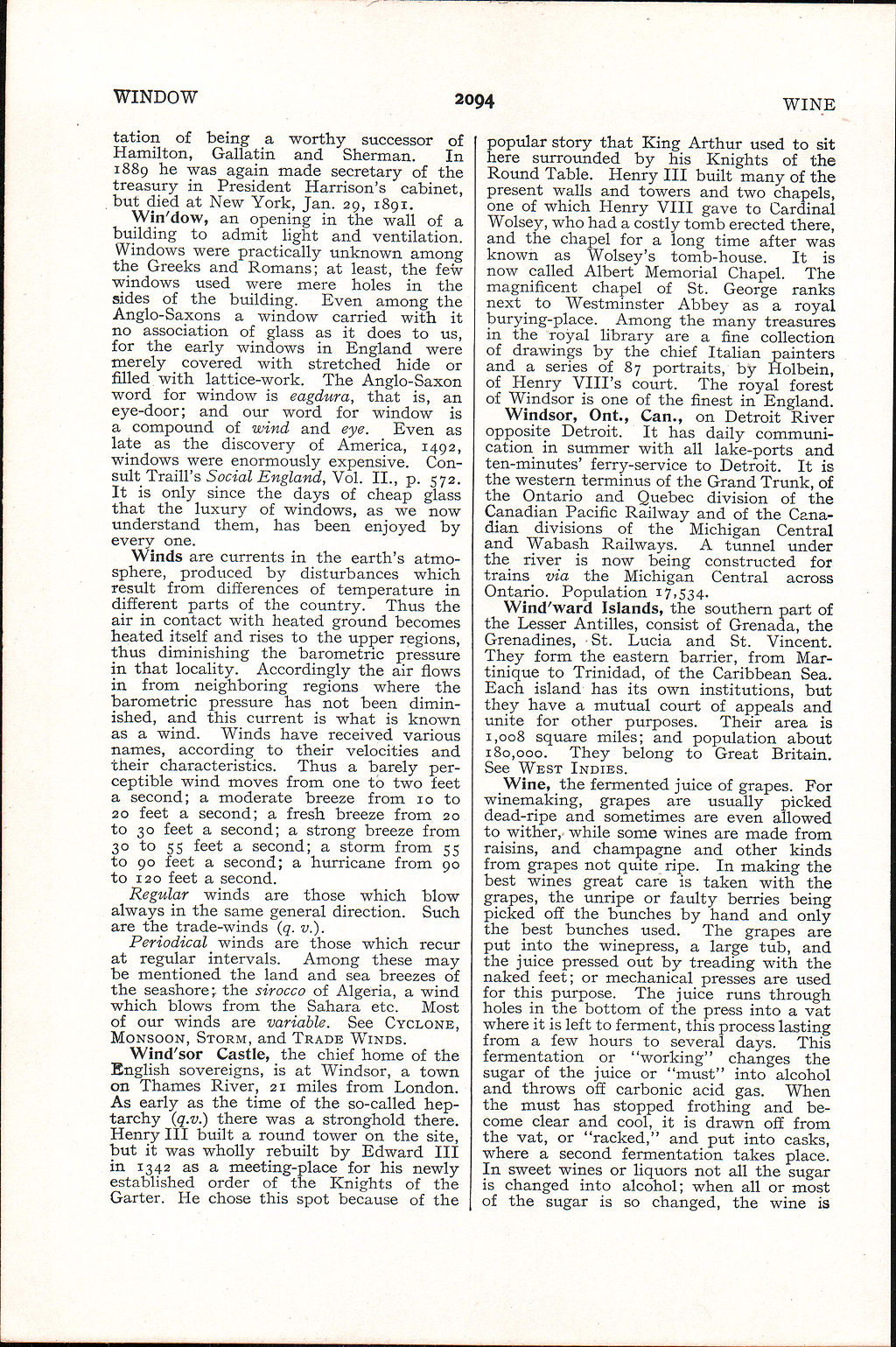WINDOW
2094
WINE
tation of being a worthy successor of Hamilton, Gallatin and Sherman. In 1889 ne was again made secretary of the treasury in President Harrison's cabinet, but died at New York, Jan. 29, 1891.
Win'dow, an opening in the wall of a building to admit light and ventilation. Windows were practically unknown among the Greeks and Romans; at least, the few windows used were mere holes in the sides of the building. Even among the Anglo-Saxons a window carried with it no association of glass as it does to us, for the early windows in England were merely covered with stretched hide or filled with lattice-work. The Anglo-Saxon word for window is eagdura, that is, an eye-door; and our word for window is a compound of wind and eye. Even as late as the discovery of America, 1492, windows were enormously expensive. Consult Traill's Social England, Vol. II., p. 572. It is only since the days of cheap glass that the luxury of windows, as we now understand them, has been enjoyed by every one.
Winds are currents in the earth's atmosphere, produced by disturbances which result from differences of temperature in different parts of the country. Thus the air in contact with heated ground becomes heated itself and rises to the upper regions, thus diminishing the barometric pressure in that locality. Accordingly the air flows in from neighboring regions where the barometric pressure has not been diminished, and this current is what is known as a wind. Winds have received various names, according to their velocities and their characteristics. Thus a barely perceptible wind moves from one to two feet a second; a moderate breeze from 10 to 20 feet a second; a fresh breeze from 20 to 30 feet a second; a strong breeze from 30 to 55 feet a second; a storm from 55 to 90 feet a second; a hurricane from 90 to 120 feet a second.
Regular winds are those which blow always in the same general direction. Such are the trade-winds (q. v.).
Periodical winds are those which recur at regular intervals. Among these may be mentioned the land and sea breezes of the seashore; the sirocco of Algeria, a wind which blows from the Sahara etc. Most of our winds are variable. See CYCLONE, MONSOON, STORM, and TRADE WINDS.
Wind'sor Castle, the chief home of the Bnglish sovereigns, is at Windsor, a town on Thames River, 21 miles from London. As early as the time of the so-called heptarchy (q.v.) there was a stronghold there. Henry III built a round tower on the site, but it was wholly rebuilt by Edward III in 1342 as a meeting-place for his newly established order of the Knights of the Garter. He chose this spot because of the
popular story that King Arthur used to sit here surrounded by his Knights of the Round Table. Henry III built many of the present walls and towers and two chapels, one of which Henry VIII gave to Cardinal Wolsey, who had a costly tomb erected there, and the chapel for a long time after was known as Wolsey's tomb-house. It is now called Albert Memorial Chapel. The magnificent chapel of St. George ranks next to Westminster Abbey as a royal bury ing-place. Among the many treasures in the royal library are a fine collection of drawings by the chief Italian painters and a series of 87 portraits, by Holbein, of Henry VIII's court. The royal forest of Windsor is one of the finest in England.
Windsor, Ont., Can., on Detroit River opposite Detroit. It has daily communication in summer with all lake-ports and ten-minutes' ferry-service to Detroit. It is the western terminus of the Grand Trunk, of the Ontario and Quebec division of the Canadian Pacific Railway and of the Canadian divisions of the Michigan Central and Wabash Railways. A tunnel under the river is now being constructed for trains via the Michigan Central across Ontario. Population 17,534-
Wind'ward Islands, the southern part of the Lesser Antilles, consist of Grenada, the Grenadines, St. Lucia and St. Vincent. They form the eastern barrier, from Martinique to Trinidad, of the Caribbean Sea. Each island has its own institutions, but they have a mutual court of appeals and unite for other purposes. Their area is 1,008 square miles; and population about 180,000. They belong to Great Britain. See WEST INDIES.
Wine, the fermented juice of grapes. For winemaking, grapes are usually picked dead-ripe and sometimes are even allowed to wither, while some wines are made from raisins, and champagne and other kinds from grapes not quite ripe. In making the best wines great care is taken with the grapes, the unripe or faulty berries being picked off the bunches by hand and only the best bunches used. The grapes are put into the winepress, a large tub, and the juice pressed out by treading with the naked feet; or mechanical presses are used for this purpose. The juice runs through holes in the bottom of the press into a vat where it is left to ferment, this process lasting from a few hours to several days. This fermentation or "working" changes the sugar of the juice or "must" into alcohol and throws off carbonic acid gas. When the must has stopped frothing and become clear and cool, it is drawn off from the vat, or "racked," and put into casks, where a second fermentation takes place. In sweet wines or liquors not all the sugar is changed into alcohol; when all or most of the sugar is so changed, the wine is
